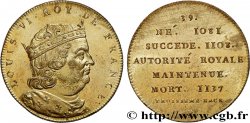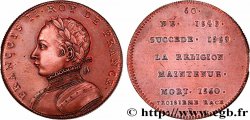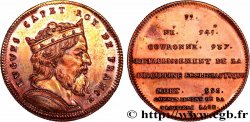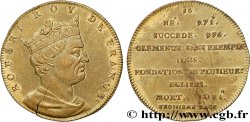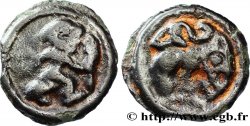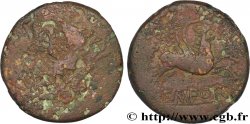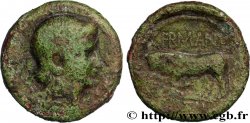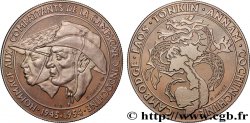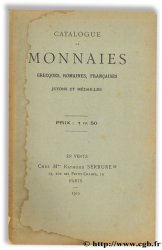E-auction 636-637546 - fme_1018769 - SÉRIE MÉTALLIQUE DES ROIS DE FRANCE Médaille, Charlemagne - 23 - refrappe ultra-moderne
得先注册又得到批准才可以报价。为了报价注册. 客户应该得到公司允许,那种过程需要 48 个小时。别等出售结束那一天才登记。您报价的话等于您赞成买那物品,而且按« 保价 » 证明您接受 cgb.fr 因特网拍卖使用法.
报价时只可以出全数值欧元总额。物品描述也说明销售结束时间,结束后出价都不会生效。 报价命令转达有时变动,等到最后秒钟增加否决的可能会。想多了解的话请注意 因特网拍卖常问
购货人不付费
购货人不付费
| 估算 : | 20 € |
| 价格 : | 3 € |
| 最高出价 : | 6 € |
| 拍卖结束日期 : | 23 June 2025 20:20:40 |
| 竞拍人 : | 2 竞拍人 |
种类 Médaille, Charlemagne - 23 - refrappe ultra-moderne
日期: n.d.
材质 gilt bronze
直径 34 mm
模子方针 12 h.
重量 20,75 g.
侧面 cannelée
印模 corne d’abondance
关于品相的说明
Patine hétérogène avec des traces de manipulation et rayures
正面
正面的文字 CHARLEMAGNE ROY DE FRANCE.
正面的说明书 Buste imaginaire lauré, cuirassé et drapé à gauche.
背面
背面的文字 23. / NÉ. 742. / SUCCEDE. 768. / COURONNÉ EMPEREUR / D’OCCIDENT. 800. / MORT. 814. / SECONDE RACE. / P..
背面的说明书 Légende en 8 lignes.
评论
Médaille conservée sous capsule et dorée à l’or fin. Refrappe ultra-moderne des séries de jetons.
Charles Ier, dit le Grand ou Charlemagne (en latin Carolus Magnus, en allemand Karl der Große), est né le 2 avril, probablement en 742 ou 748, sans certitude quant au lieu de naissance. Il est mort à Aix-la-Chapelle le 28 janvier 814. Il est roi des Francs (768-814), devient par conquête roi des Lombards (774-814) et est couronné empereur par le pape Léon III le 25 décembre 800, relevant une dignité prestigieuse disparue depuis l'an 476 en Occident.
Monarque guerrier, il agrandit notablement son royaume par une série de campagnes successives, en particulier par la lente mais néanmoins violente soumission des Saxons païens (772-804). Souverain réformateur, soucieux d'orthodoxie religieuse et de culture, il protège les arts et les lettres et est à l'origine de la « renaissance carolingienne ».
Son œuvre politique immédiate ne lui survit pas longtemps. Respectueux de la tradition germanique en matière successorale, Charlemagne avait prévu le partage de l'Empire entre ses trois fils dès 806. L'empire ne sera finalement partagé entre ses trois petits-fils qu'au traité de Verdun en 843. Le morcellement féodal des siècles suivants, puis la division de l'Europe en États-Nations rivaux condamnent à l'impuissance ceux qui tentent explicitement de restaurer l'empire universel de Charlemagne, en particulier les souverains du Saint-Empire romain germanique, d'Otton Ier en 962 à Charles Quint au XVIe siècle, ou encore Napoléon Ier, hanté par l'exemple du plus éminent des Carolingiens.
Pour la suite de sa biographie, voir http://fr.wikipedia.org/wiki/Charlemagne.
Medal preserved in a capsule and gilded with fine gold. Ultra-modern re-minting of token series.
Charles I, known as the Great or Charlemagne (in Latin Carolus Magnus, in German Karl der Große), was born on April 2, probably in 742 or 748, without certainty as to the place of birth. He died in Aix-la-Chapelle on January 28, 814. He was king of the Franks (768-814), became king of the Lombards by conquest (774-814) and was crowned emperor by Pope Leo III on December 25, 800, reviving a prestigious dignity that had disappeared in the West since the year 476..
A warrior monarch, he significantly expanded his kingdom through a series of successive campaigns, in particular through the slow but nevertheless violent submission of the pagan Saxons (772-804). A reforming sovereign, concerned with religious orthodoxy and culture, he protected the arts and literature and was at the origin of the \\\"Carolingian renaissance\\\".
His immediate political work did not long outlive him.. Respectful of the Germanic tradition in matters of succession, Charlemagne had planned the division of the Empire between his three sons from 806. The empire was finally divided between his three grandsons only at the Treaty of Verdun in 843.. The feudal fragmentation of the following centuries, then the division of Europe into rival nation-states, condemned to impotence those who explicitly attempted to restore the universal empire of Charlemagne, in particular the sovereigns of the Holy Roman Empire, from Otto I in 962 to Charles V in the 16th century, or even Napoleon I, haunted by the example of the most eminent of the Carolingians..
For the rest of his biography, see http://fr. Wikipedia. org/wiki/Charlemagne
Charles Ier, dit le Grand ou Charlemagne (en latin Carolus Magnus, en allemand Karl der Große), est né le 2 avril, probablement en 742 ou 748, sans certitude quant au lieu de naissance. Il est mort à Aix-la-Chapelle le 28 janvier 814. Il est roi des Francs (768-814), devient par conquête roi des Lombards (774-814) et est couronné empereur par le pape Léon III le 25 décembre 800, relevant une dignité prestigieuse disparue depuis l'an 476 en Occident.
Monarque guerrier, il agrandit notablement son royaume par une série de campagnes successives, en particulier par la lente mais néanmoins violente soumission des Saxons païens (772-804). Souverain réformateur, soucieux d'orthodoxie religieuse et de culture, il protège les arts et les lettres et est à l'origine de la « renaissance carolingienne ».
Son œuvre politique immédiate ne lui survit pas longtemps. Respectueux de la tradition germanique en matière successorale, Charlemagne avait prévu le partage de l'Empire entre ses trois fils dès 806. L'empire ne sera finalement partagé entre ses trois petits-fils qu'au traité de Verdun en 843. Le morcellement féodal des siècles suivants, puis la division de l'Europe en États-Nations rivaux condamnent à l'impuissance ceux qui tentent explicitement de restaurer l'empire universel de Charlemagne, en particulier les souverains du Saint-Empire romain germanique, d'Otton Ier en 962 à Charles Quint au XVIe siècle, ou encore Napoléon Ier, hanté par l'exemple du plus éminent des Carolingiens.
Pour la suite de sa biographie, voir http://fr.wikipedia.org/wiki/Charlemagne.
Medal preserved in a capsule and gilded with fine gold. Ultra-modern re-minting of token series.
Charles I, known as the Great or Charlemagne (in Latin Carolus Magnus, in German Karl der Große), was born on April 2, probably in 742 or 748, without certainty as to the place of birth. He died in Aix-la-Chapelle on January 28, 814. He was king of the Franks (768-814), became king of the Lombards by conquest (774-814) and was crowned emperor by Pope Leo III on December 25, 800, reviving a prestigious dignity that had disappeared in the West since the year 476..
A warrior monarch, he significantly expanded his kingdom through a series of successive campaigns, in particular through the slow but nevertheless violent submission of the pagan Saxons (772-804). A reforming sovereign, concerned with religious orthodoxy and culture, he protected the arts and literature and was at the origin of the \\\"Carolingian renaissance\\\".
His immediate political work did not long outlive him.. Respectful of the Germanic tradition in matters of succession, Charlemagne had planned the division of the Empire between his three sons from 806. The empire was finally divided between his three grandsons only at the Treaty of Verdun in 843.. The feudal fragmentation of the following centuries, then the division of Europe into rival nation-states, condemned to impotence those who explicitly attempted to restore the universal empire of Charlemagne, in particular the sovereigns of the Holy Roman Empire, from Otto I in 962 to Charles V in the 16th century, or even Napoleon I, haunted by the example of the most eminent of the Carolingians..
For the rest of his biography, see http://fr. Wikipedia. org/wiki/Charlemagne








 对产品描述纠错
对产品描述纠错 打印
打印 分享我的选择
分享我的选择 提问
提问 Consign / sell
Consign / sell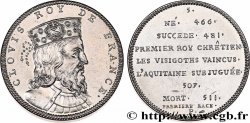
 产品介绍
产品介绍